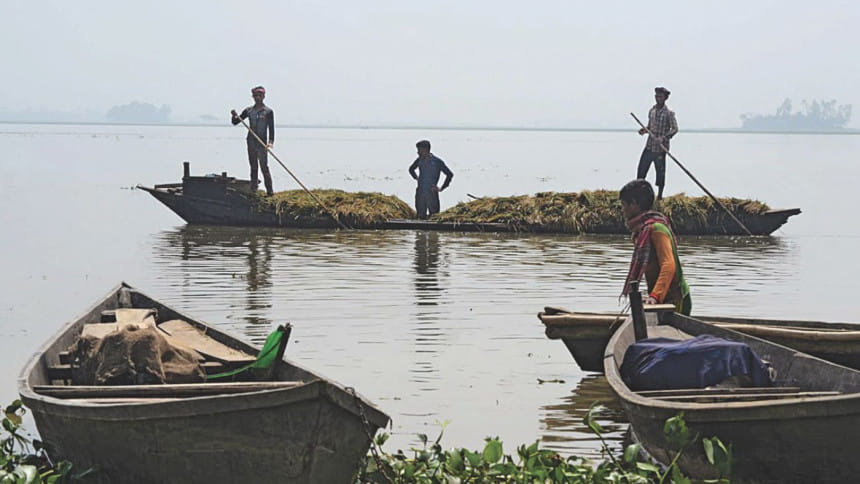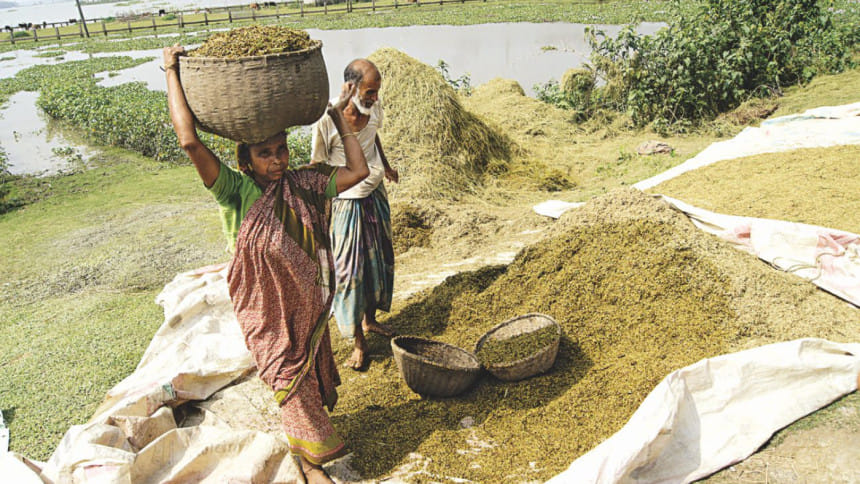Prelude to a spreading nightmare

The recent flash floods in the haor regions exemplify the threat of climate change that looms over Bangladesh. It signifies our national ignorance of climate change and its impact on haors and other disaster prone areas. On the occasion of International Mother Earth Day, we focus on why the fate of the haors, with their rich biodiversity and agriculture, should matter to the rest of the country.
The death of Tara Banu should have shocked the country. It should have forced us to sit up and take notice. But all it did was reconfirm that the life and death of farmers, the so-called lifeblood of our economy, does not affect the wider national conscience. At least not as much as the Shakib and Apu odyssey.
There was no Pahela Baishakh celebration for the farmers of the country's northeastern region this year. Ironic when you think about it, because originally the first day of Baishakh was declared as the first day of the year to ease the burden of farmers, so that it could be easier for them to pay taxes. On Pahela Baishakh, we savoured our panta bhaat as usual without even realising that the farmers of our haor regions had to suffer the destruction of rice paddy fields in over one lakh hectares of land. Oh, the irony of it all!
Thousands of farmers like Tara Banu, who died of a heart attack after learning that flash floods had inundated most of her crops in Habiganj's Baniachong upazila, lost vast areas of farmland when early flash floods destroyed them in the country's northeastern region. Out of 20,070 hectares of land in haor areas, 19,500 hectares have been affected, and 87 embankments damaged. Moreover, the flash floods have reportedly caused damage to crops worth around Tk 6,000 crore.
Flash floods are not a new phenomenon for farmers of the haor regions of Habiganj, Sunamganj, Kishoreganj, Netrokona and other northeastern districts. As explained by Professor AKM Saiful Islam of the Institute of Water and Flood Management at the Bangladesh University of Engineering and Technology (BUET), water levels of the Surma River cross the 6.5 metre mark generally during April, causing flash floods. While farmers are usually prepared for such an occurrence every year as they harvest a major portion of the Boro crops before mid-April when the floods usually hit the region, they were completely taken by surprise by the early floods that inundated their farmlands on March 27.

It's not just the croplands that have been affected by the flash floods. Thousands of fish were found floating in rivers in the initial aftermath of the disaster. And as if to exacerbate the plight of the haor farmers, hundreds of ducks have reportedly been found dead in Sylhet's Fenchuganj and Hakaluki Haor, where duck farming is a major source of livelihood. Farmers like Anwar Miah and Abdul Quayum, who lost all of their ducks, call this a 'plague', a disaster that has ruined everything it touched. What is worrying is that the haor people are far from getting rid of this plague. Experts fear there ,may be a link between the toxicity of the water and possible exposure from open uranium pits across the border in India. Dr Nasrin Sultana, head of the Animal Science Department of Sylhet Agriculture University, further warns that if the fish and birds are consumed, it could be fatal to human beings as well – a warning that only adds to the worries of the stricken residents of the regions.
Haor areas like Hakaluki and Tanguar, designated as Ramsar sites of international importance for the conservation and sustainable utilisation of wetlands, are home to a wide variety of wildlife species, some of which have already been declared vulnerable, endangered and critically endangered. This makes the changes in climate, and their subsequent effects on the regions, even more alarming.
Early flash floods in haor areas could be attributed to climate change, explains Professor Islam. "The intensity and frequency of extreme weather has been changing due to climate change," he says, which affect agricultural productivity, land use practice, lifestyles and livelihoods of the haor areas.
According to a research study by the International Water Resources Association (IWRA), agricultural crops of haor areas are especially sensitive to different natural disasters, including flash floods, drought, storm surges, etc. Thus, "any alternation of rainfall and temperature cycle, as a result of climate change hampers agriculture production significantly" (A Study on Climate Change Impact on the Livelihoods of the People in Tanguar Haor, Bangladesh). A recent study by BUET also claims that pre-monsoon rainfall and its intensity will mostly likely increase in the future, with the probability of occurrence of flash floods likely to be higher in future due to climate change.
The claim of International Organisation for Migration that around six million people of Bangladesh have been displaced from their homes due to climate change should thus not come as a surprise. In fact, as a result of the flash floods, many farmers of Sunamganj, Kishoreganj, Netrakona, Habiganj, and other northeastern districts, have already sold their cattle and other valuables and left their homes in search of manual work in nearby towns. Farmers usually take agriculture loans to augment their meagre earnings, and it can take them years to repay these loans. And then when they are hit with a disaster of such scale, which makes it difficult for them to harvest even a kilogram of rice, they have no alternative but to sell their cattle and sometimes even their land to repay their loans. Rashid Ali of Sunamganj heartbreakingly informed this paper (Havoc in Haor, April 14, 2017) that he had to sell four of his seven cows to repay loans he took to cultivate rice. Now he has no idea how to run his family. Under these circumstances, many farmers are forced to become climate refugees, constantly on the move in search of a shelter and an opportunity to earn a livelihood. It is again ironic that while loan defaulters who steal millions of taka from banks are allowed to stand tall and continue with their business in our society, farmers are regularly harassed to repay the relatively insignificant loans they take out and that too at a high interest rate.
This year, International Mother Earth Day, which calls for a collective responsibility to "promote harmony with nature and the Earth to achieve a just balance among the economic, social, and environmental needs of present and future generations of humanity" as stated in the 1992 Rio Declaration, will focus on environmental and climate literacy. Which brings us to the question: despite being one of the most vulnerable countries to climate change, how literate is Bangladesh about climate change and its effects? We know that there is a 'thing' called climate change and that we get aid and grants from international organisations and countries to combat its immensely negative impacts, but how aware are we about these impacts? Do we really care that if we are not careful, if we fail to understand why the fate of the haors will eventually affect the fate of the whole country, we can literally go under?
According to a study titled 'Predictors of Public Climate Change Awareness and Risk Perception Around the World', by the Yale Program on Climate Change Communication, while 90 percent of the public is aware of climate change in developed economies in North America and Europe relatively few are aware of the issue in many developing countries, even though "many do report having observed changes in local weather patterns." According to the study, while "40 percent of adults worldwide have never even heard of climate change, this rises to more than 65 percent in some developing countries like Egypt, Bangladesh and India."
Our ignorance regarding climate change and its impacts is probably what enables immense corruption when it comes to mitigating climate change. Locals of haor areas allege that the embankments, which were supposed to protect them from such natural disasters, were faulty, accusing those responsible of construction and repairing works of the embankments surrounding haor areas of corruption. At a roundtable at Dhaka Reporters Unity, farmers further blamed the rising of riverbeds by siltation as one of the main reasons why the flash floods were able to completely destroy the crops. Contractors who built the embankments were hired by the Bangladesh Water Development Board (BWDB), and thus it was the responsibility of the said board to ensure that they completed their work in due time and with utmost diligence. A job they failed to do. As a result of faulty, and in some cases absent, embankments, flood water entered croplands from all sides.
According to a leading Bangla daily, the BWDB sought bids for 28 embankments in 116 packages in the last two years; however, the contractors they hired did not manage to complete even 20 percent of the work for which Tk 800 million was disbursed. Deputy Director of ACC, Pranab Kumar Bhattacharya, while stating that they will be launching a probe into allegations of graft over Sunamganj embankments, also alleged that three engineers and contractors "plotted together to embezzle Tk 250 million without doing anything for the projects." The report further accused the contractors of bribing the officials with 5 percent commission for securing the works and 15 percent for clearing of bills. The ACC has already formed a committee to check whether fraud was indeed responsible for the wide-scale devastation in haor areas, and the executive engineer of BWDB in Sunamganj, Afsar Uddin, has been withdrawn for his alleged involvement in corruption.
We can cry foul and debate the morality of the authorities who are supposed to be protecting the public from disasters of such magnitude. But does that help Tara Banu and thousands of farmers who lost their homes, their livelihoods to a disaster that could have been tackled? Our helplessness lies in our ignorance, in our inability to care, and our tendency to neglect. The Mother Earth that we hope to save lies in our very heartlands, the areas that give us so much but continue to be ignored and exploited. And until we seriously start focussing on these areas and listening to the cries of the farmers and fishermen who help run this country, the crisis will not be limited to the haor or coastal regions. So we can wait until climate change and the corruption surrounding it finally hits urban areas where the 'educated', the 'civilised' people live, or we can do everything in our power to ensure that does not happen. The choice is that simple.
The writer is a member of the editorial team, The Daily Star.

 For all latest news, follow The Daily Star's Google News channel.
For all latest news, follow The Daily Star's Google News channel. 



Comments